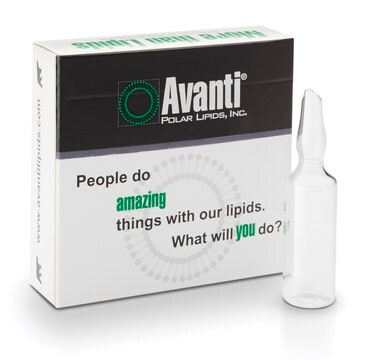860520P
Avanti
C20 Ceramide (d18:1/20:0)
Avanti Research™ - A Croda Brand 860520P, powder
Synonym(s):
N-arachidoyl-D-erythro-sphingosine
About This Item
Recommended Products
form
powder
packaging
pkg of 1 × 5 mg (860520P-5mg)
manufacturer/tradename
Avanti Research™ - A Croda Brand 860520P
lipid type
sphingolipids
shipped in
dry ice
storage temp.
−20°C
SMILES string
OC[C@]([H])(NC(CCCCCCCCCCCCCCCCCCC)=O)[C@]([H])(O)/C=C/CCCCCCCCCCCCC
InChI
1S/C38H75NO3/c1-3-5-7-9-11-13-15-17-18-19-20-22-24-26-28-30-32-34-38(42)39-36(35-40)37(41)33-31-29-27-25-23-21-16-14-12-10-8-6-4-2/h31,33,36-37,40-41H,3-30,32,34-35H2,1-2H3,(H,39,42)/b33-31+/t36-,37+/m0/s1
InChI key
XWBWIAOWSABHFI-NUKVNZTCSA-N
General description
Application
- as a standard to quantify ceramide content in muscle tissue samples using high-performance liquid chromatography/tandem mass spectrometry (LC/MS2)
- as a standard for the quantitation of sphingolipid metabolites
- to study its effects on mitochondrial-to-cytosolic stress response (MCSR) induction
Biochem/physiol Actions
Packaging
Legal Information
also commonly purchased with this product
Storage Class Code
11 - Combustible Solids
Regulatory Listings
Regulatory Listings are mainly provided for chemical products. Only limited information can be provided here for non-chemical products. No entry means none of the components are listed. It is the user’s obligation to ensure the safe and legal use of the product.
JAN Code
860520P-VAR:
860520P-5MG:
860520P-BULK:
Certificates of Analysis (COA)
Search for Certificates of Analysis (COA) by entering the products Lot/Batch Number. Lot and Batch Numbers can be found on a product’s label following the words ‘Lot’ or ‘Batch’.
Already Own This Product?
Find documentation for the products that you have recently purchased in the Document Library.
Customers Also Viewed
Our team of scientists has experience in all areas of research including Life Science, Material Science, Chemical Synthesis, Chromatography, Analytical and many others.
Contact Technical Service











